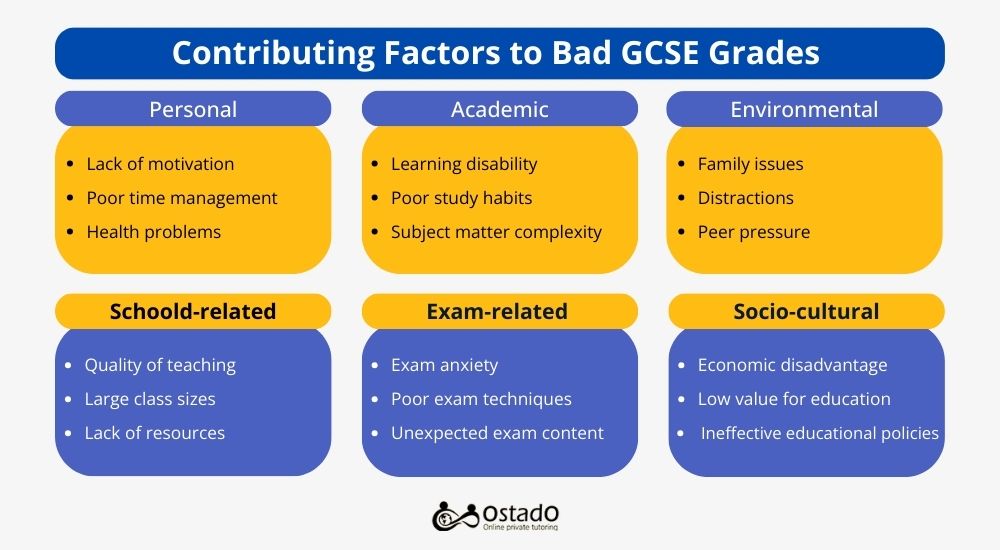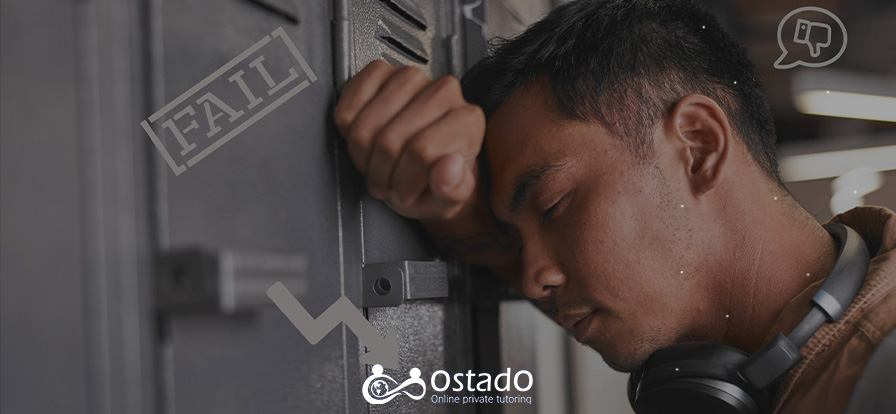Sometimes, things do not work out the way you like; that’s just how it is. Getting bad GCSE results is one of these disappointing situations, but what makes it dangerous is not knowing what to do next.
If your GCSE grades are below 4 (standard pass) or you passed the exam but didn’t get the desired grades, you may want to read this post to learn your next steps.
What’s the first step? It’s terminating the negative thoughts and feelings. Failure teaches us lessons the hard way, but these lessons are actually learning opportunities. Let’s see how.
What GCSE Grade Is a Bad GCSE Grade?
Before we explore the options with bad GCSE grades, let’s see what we mean by bad GCSE grades.
The answer to this question is fairly subjective and depends on your plans for the future. Which college do you want to apply for? Which subject do you want to major in? What kind of career do you fancy yourself doing? You need to answer these questions before determining what bad GCSE grades are.
Let me illustrate this for you. Imagine you want to enrol in St. Olave’s Grammar School, and you get a 6 for five GCSEs. Normally, this is an acceptable performance, but it is still not enough, considering your goal of entering St. Olvae’s Graamr School because it requires a minimum of six GCSEs at grade 7 or above.
GCSE Grading Scale in a Nutshell
Generally speaking, the passing score for the GCSEs is 4. Grade 5 is considered a strong pass, and higher grades can pave the way for future educational success. Grades 1, 2, and 3 are failing grades, and for GCSEs under 4, you need to re-sit the exams. The table below summarises the GCSE grading system in the UK.
| GCSE Grading Scale | ||
| Numeric Grade | Old Letter Grade Equivalent | Description |
| 9 | A* | Highest grade, indicating exceptional performance |
| 8 | A* | Slightly below a 9, still indicating excellent performance |
| 7 | A | Strong performance |
| 6 | B | Good performance |
| 5 | C (strong pass) | Strong pass; considered a good achievement |
| 4 | C (standard pass) | Standard pass; minimum pass level for most purposes |
| 3 | D | Below pass; indicates some understanding but below standard pass level |
| 2 | E | Poor performance |
| 1 | F/G | Very poor performance |
| U | U | Ungraded; indicates performance below the minimum required level |
Also read: What Happens on GCSE Results Day
What Choices Do You Get With Lower Grades?
A bad GCSE results paper is not the end of the world. You have several options to consider if you fail GCSEs.
1. Retake GCSE
If GCSE qualifications are your preferred path to higher education, you can retake GCSEs next summer with more practice, revision, and experience. But if you are having second thoughts about the academic path to success, you can go down different paths. You can read “Alternatives to GCSEs” to check out your options.
If you want to pursue your education but need help getting better grades, Ostado’s GCSE tutors can help you achieve your educational goals. Our tutors have extensive experience preparing students at the GCSE level and improving their performance. You can find professional GCSE tutors with reasonable tuition fees in different GCSE fields, including Maths, Biology, Physics, and Chemistry.
2. Appeal Against a GCSE
Grading GCSE exams follows an exhaustive procedure but there is a small possibility for faulty grading. So, if you really think that there has been a mistake in grading your GCSE grade, you can appeal against it. Click on “Appeal against a GCSE, AS or A level grade or the result of a qualification” to learn how.
3. Enrol in Vocational Courses
You can enrol in vocational courses such as the Business and Technology Education Council (BTECs) and National Vocational Qualifications (NVQs). These courses are career-oriented, and they can also lead to college-level education.
4. Apprenticeship
Apprenticeships are another path you can follow if you fail the GCSEs. This is a great way to learn and earn simultaneously. You can be an apprentice in a wide range of industries and turn the apprenticeship into a life-long career. Click to learn whether you qualify to find an apprenticeship.
5. Find a Job
Jumping into the workforce is another option for you with bad GCSE grades. You can find entry-level jobs that don’t require GCSE qualifications. These jobs usually have an on-the-job training program that makes up for the lack of qualifications. You can contact 0800 100 900 to speak to a careers advisor.
Remember, this is an important decision to make, and you should seek expert advice from a career advisor or educational counsellor to make an informed decision.
Understanding the Root Causes of GCSE Failure
Poor performance and low GCSE scores can result from different issues. These issues are sometimes rooted within the person and sometimes caused by external factors. However, more often than not, they are a combination of both.

Internal Causes of Bad GCSE Results
Internal causes of bad GCSE grades result from our decisions. There is actually a chain of cause and effect here. Let me explain.
When you don’t understand a particular discipline, say Physics, you lose interest in it. When you lose interest, you don’t listen to the teacher in the Physics class, which again aggravates your poor understanding of the Physics subjects. Then, you lose the motivation you need to plan and study Physics. As a result, you allocate no (or insufficient) time to GCSE Physics exam revision.
Without enough studying and practice, the questions on the exam paper can be shocking. Ultimately, you get bad GCSE Physics scores.
External Causes of Bad GCSE Results
Bad results can also be triggered by external factors. Again, here, we have a cycle of cause and effect. Imagine being a member of an unsupportive or impoverished family. In such a family, not only do the students get external motivation, but they also need to put extra effort into studying and preparing for the exam.
They need to fight off the distractions in their living environment. Of course, these distractions are not always hostile. The student’s cell phone notifications can also be a source of distraction.
School-related factors can also prevent a student from passing the GCSE exam. Due to the large class size, teachers cannot give focused attention to the students. Some students might need extra help or further attention, but the school conditions do not allow the teachers to check on all students.
Even if school conditions were fine, it would be too much of a burden on the teacher’s shoulders to attend to every one of the students.
External factors can also be attributed to sociocultural factors and governmental policies on the education system, but this issue is too big to be covered in my tiny article.
The Potential Impact of Bad GCSEs on Your Future
The effects of bad GCSE grades are multifaceted. But what matters here is that, despite the challenges, bad grades don’t define your potential. With the right support and determination to succeed, you can neutralise the impact of bad GCSEs.
Emotional Aftermath of Failure
Perhaps the most enduring effect is the daunting feeling of failure. Getting low GCSE grades can shake your confidence and self-esteem. Even worse, it can demotivate you and prevent you from trying. Additionally, it can bring about shame because you cannot live up to your parent’s expectations. I will tell you how to deal with these exam-caused negative feelings in a bit.
Limited Choices
Bad GCSE results can also harm your educational and career prospects. With lower grades, you cannot proceed to sixth forms or further education colleges. Also, applying to good universities requires high A-level qualifications, which are hard to attain if your GCSE grades are low.
On the other hand, poor academic performance dims your professional prospects and limits your choices in the future. Even apprenticeships, which are an alternative to the traditional academic routes, need some entry-level requirements, including above-4 GCSE grades.
Loss of Time
Finally, with poor GCSE results, you would fall behind in your life because you would need to spend extra time retaking the GCSEs. Needless to say, you have to incur the costs of additional courses and exam retakes when you fail the GCSEs.
How to Find Motivation After GCSE Failure
As human beings, everyone is unique. You have different preferences and interests. So, it is only natural if some of you do not perform well in exams. The most important thing to do after failing GCSEs is to keep calm. Bad GCSE results do not define your capabilities.
Share Your Feelings
If you need to, talk to someone about your feelings. Sharing with family or friends alleviates these negative feelings. The support you get from family and friends is very meaningful, and sometimes, it is the push you need to make life-changing decisions.
Learn From Your Mistakes
Low GCSE scores are a wake-up call asking you if you are on the right track. What was it that you did (not) that resulted in failure? Which GCSE and what topic was the most difficult for you? What aspect of the exam scares you? Answering these questions can help you identify the gaps in your knowledge and make up for them.
Seek Professional Support
You can also share the results with a teacher or tutor and ask for their advice on how to revise for GCSE exams. They can provide professional support and motivation to get you back on track. Student Space provides support for students with whatever challenges they’re facing. Click on Student Support Services to get help via web chat, text message, or email.
Gain Inspiration From Successful People
Finally, you should know that academia is not the only path to success, and there are many people who have succeeded in life despite failing the GCSEs. I have listed some of the below. You can look them up and read their life stories. I’m sure you’ll find a spark to get on your feet and move towards your goals.

Key Takeaways – Surviving Bad GCSE Results
- Do not beat yourself up; stay positive.
- Reflect on your performance in the exam.
- Find the gaps in your knowledge that resulted in failure.
- Decide if you want to pursue your education or take a different path.
- Consult a career advisor and an educational counsellor before making a decision.
FAQs - Bad GCSE Grades
- Toggle TitleIs a 3 at GCSE a fail?Yes, it is. The lowest passing grade in the GCSE examination is 4, and anything below 4 is a fail.
- What is the lowest GCSE score?The scoring system for the GCSEs is scaled from 1 to 9, and 1 is the lowest score.
- Is a 9 bad in GCSE?Grade 9 is the highest grade the participants can get in the GCSE results.

